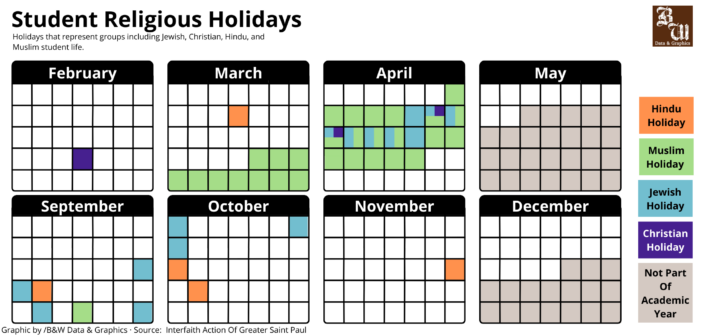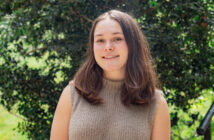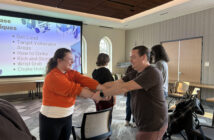Understanding the religious makeup of Lehigh University may be a difficult task.
University Chaplain Lloyd Steffen said the university has statistics on students’ religious affiliations they put together from the Common Application and from talking to leaders of religious groups on campus — but they are not completely accurate because the largest-responding group is non-secular. Asking for this information from each student on campus is not something he said he likes the idea of, since “that religious information is private.”
Steffen said the three main religious groups on campus are Christian, Jewish and Muslim. Rabbi Steve Nathan wrote in an email that there are approximately 358 Roman Catholic students, 10 Eastern Orthodox students, 334 ‘Other Christian’ students, 238 Jewish students, 35 Hindu students and 50 Muslim students for the incoming class of 2027.
Since Lehigh isn’t a religiously affiliated institution, prospective students who apply are asked about their religious affiliation but the question is completely optional, Bruce Bunnick, director of admissions, wrote in an email.
Some students who actively practice their religion have expressed concerns over university dining options in relation to their religious dietary restrictions. There are also concerns about academic accommodations offered when religious holidays coincide with class times.
Steffen said the university chaplain’s website is not up to date with contact information for religious groups on campus. The Multi-Faith Initiative, a group of students and faculty who discussed individual faiths, was suspended at the beginning of the COVID-19 pandemic, so they’ve created a Religious Life Council instead, where representatives of religious groups meet monthly to plan interfaith events on campus.
Steffen works with Associate Chaplain Rabbi Steve Nathan and is in the process of finding a director for Muslim Student Life.
“It hasn’t been my experience in my three decades that faculty do not want to respect the religious obligations that students take on,” Steffen said.
Dining Accommodations
H.H., ‘26, a member of the Muslim Students Association, said she has only experienced one cycle of Eid Al-Fitr, a celebration of the end of Ramadan, at Lehigh.
As each year passes, she said the university is becoming more aware of these needs. For example, she finds it “awesome” that the dining halls provide halal food.
“I feel like it’s definitely getting to a point where we are feeling more inclusive, it’s just not totally there yet,” H.H. said.
David Joseph, executive director of auxiliary services for Housing, Dining and Conference Services, said Lehigh Dining worked with the Muslim Students Association to find the best practices for halal foods in the dining halls.
He said Lehigh Dining spent a lot of money renovating a dedicated space in the Rathbone kitchen for halal food, including the demolition of a walk-in refrigerator, walls being knocked down to enlarge the space and designing an area that would disallow cross-contamination.
Evan Rehrig, marketing manager of Lehigh Dining, said he initially met with the Muslim Students Association last spring during Ramadan and expanded hand-harvested halal food options at Hawk’s Nest. Lehigh Dining had a follow-up meeting earlier this semester to ensure they are meeting student needs.
Rehrig said during Ramadan, they source pre-packaged, reheatable entrees that feature hand-harvested Halal meats.
He said the Purple Pita food truck and Simple Servings in Rathbone also have halal food.

The Simple Servings station in Rathbone Hall offers allergen-free food, including kosher options and certified Halal meats. Lehigh Dining worked with members of the Muslim Student Association to increase Halal food options in the dining halls on campus. (Maeve Kelly/ B&W Staff)
Zachary Weiser, ‘25, co-president of Lehigh Hillel, said he is grateful there is food put out for Jewish students to eat.
“I really appreciate that,” Weiser said. “They’re putting an effort in sometimes, but it seems like they’re picking and choosing a little bit to try to stay politically correct a little bit.”
Joseph said dining services work very closely with Nathan, whom they refer to during Passover to gauge the amount of Passover- and kosher-friendly food needed.
Rehrig said most pre-packaged products come in kosher, but they don’t have a kosher-certified buying agency. Joseph said when the Clayton University Center opens in 2025, there will be a kosher retail platform available.
Rehrig said they also make sure fish is available every Friday during Lent.
“I think we sit down and say, ‘What do you eat?’” Joseph said. “‘What are the kinds of foods that were not served to you already that you’d like to see?’”

The Simple Servings station in Rathbone Hall offers allergen-free food, including kosher options and certified Halal meats. Lehigh Dining worked with members of the Muslim Student Association to increase Halal food options in the dining halls on campus. (Maeve Kelly/ B&W Staff)
Ruth Regassa, ‘26, is a member of the African Student Association and observes Ethiopian Orthodox holidays.
Regassa said she observes Tsome Nebiyat, also known as the Nativity Fast, and Abiy Tsom, two of the seven official fasting seasons in the Ethiopian Orthodox Church.
She said Tsome Nebiyat lasts 43 days from late November to late December until the celebration of the Ethiopian Christmas on January 7. She fasts from morning until 3 p.m., and for the rest of the day, she only eats vegan food.
Regassa said she witnessed cross-contamination after a worker in Rathbone used the same serving spoon that he used for turkey with potatoes.
“I think that was my biggest thing, where it’s like they kind of didn’t care,” Regassa said.
Sanchita Shrivastava, ‘26, and Kavya Anand, ’26, co-presidents of Hindu YUVA, said they both celebrate Diwali, the festival of lights for five nights; Navratri, a festival worshiping Goddess Durga for nine nights; and Holi, a two-day festival of colors.
Shrivastava said they have both experienced a lack of meal accommodations during holidays since they cannot eat meat or eggs.
“I feel like being on a meal plan and then following the strict regulations are difficult,” Shrivastava said. “There’s no options for us.”
Academic Accommodations
Steffen said professors are aware of the policy that exists to protect holidays.
According to the accommodation policy from the university Chaplain’s Office and Provost, the policy is made to honor the right of university faculty, staff and students to engage in religious observances, specifically as it relates to religious holidays.
Though the policy does not exempt students from meeting course requirements or completing assignments, it supports any member of the Lehigh community in requesting absence for demands of religious holiday observance.
“The institution is not going to be an obstacle to a student who wants to observe religious holidays,” Lloyd said. “And if there is some kind of holiday obstacle, it’s probably just some kind of misunderstanding or misinformation — and that can all be straightened out.”
Steffen said the vast majority of problems that have come up around religious accommodations arise because new faculty, staff and students are not familiar with these university policies. New faculty receive information about the policies regarding religious holiday observance in the orientation process, and Steffen is one of the people who speak to new faculty during orientation.
Steffen said the policy is only effective when students take the responsibility to reach out to faculty members and request time off for religious observance.
Weiser said he thinks he is one of the more religious kids on campus because he doesn’t use technology during the holidays. He said there have been times when he had exams the day after a holiday which makes it more challenging because he must find other ways to study.
He said he has never had a test on Yom Kippur but knows there are students this year who had a common hour exam for economics that day.
“I think it’s hard to say that we’re not being treated fairly and (are) underrepresented in certain ways,” Weiser said.
H.H. said she believes there should be more academic accommodations, as she took a chemistry exam in her first year during Eid al-Fitr, and her professor didn’t allow accommodations for her exam and homework.
“On Eid, I was doing math and chemistry homework,” H.H. said. “But kids that are Christian or not Muslim get the luxury of fully being able to celebrate Christmas or celebrate Easter.”
Emma Brown, ‘26, a member of the Reformed University Fellowship, said she’s heard complaints about not getting enough time off for Easter.
“As another religious organization, and to know the importance of religion in my own life, I would want that to be respected for all other religions on campus,” Brown said.
She said all of the religious clubs should get time off and students should not have to take a test the day they’re fasting.
H.H. said fasting during holidays like Ramadan is not meant to be something “that gets you out of” work because it makes the reasons for fasting less beneficial.
“The actual teaching about Ramadan is not that people should not work,” Steffen said. “It’s actually the opposite of that…and the fasting is a spiritual practice to make them more aware of God…but it doesn’t have anything to do with requesting time off from work.”
Shrivastava said she had a major assignment due during Diwali and emailed her professor. Anand also had an exam the day after Diwali.
Shrivastava said they didn’t necessarily give her an accommodation since they always drop two of the lowest-graded exams, so she was told she could just miss the test and drop the grade. S ended up taking the exam anyway.
“Obviously I would take the time out and do it rather than just not do it and get a zero,” Shrivastava said.
Shrivastava is an international student and said in India, students have a five-day break for Diwali similar to Thanksgiving break, but since they don’t receive time off at Lehigh, they celebrate the evening of Diwali instead.
“Our winter break, Christmas falls in there, and Diwali is like our Christmas, and we don’t have that off,” Anand said. “It makes it difficult for us to observe our holidays that have meant a lot to us throughout our whole life.”
Chemistry professor Andy Ho said he looks at the religious holiday calendar before the semester starts to make sure exam dates don’t conflict.
Ho said there is a class policy that says if a student misses class, there are no makeups to be fair to everyone, so more weight is put on other exams if one is missed.
“It’s not possible to write two different exams that are not carbon copies of each other,” Ho said.
He said he would certainly contact the Chaplain’s Office if there’s an ambiguous issue with religious observance and assignments.
Steffen said if a professor denies a student an accommodation, then the student should come and see him to discuss the issue with the professor and indicate the need to devise an accommodation.
“You don’t want to put a student at a disadvantage,” Steffen said. “You also don’t want to put them at an advantage, so the professor (has to) figure that stuff out.”
Lawrence Tartaglia, a professor of biology, has worked at Lehigh for three years and said his accommodations are equitable and fair.
“It’s not an issue,” Tartaglia said. “It’s, ‘How do we work around it?’”






Comment policy
Comments posted to The Brown and White website are reviewed by a moderator before being approved. Incendiary speech or harassing language, including comments targeted at individuals, may be deemed unacceptable and not published. Spam and other soliciting will also be declined.
The Brown and White also reserves the right to not publish entirely anonymous comments.